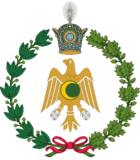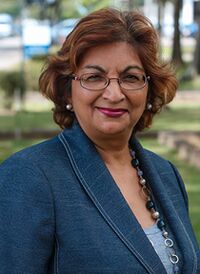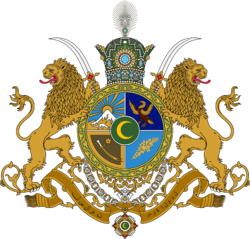1707 Çakaristan elections
| ← 1705 1707 1709 → Grand Vizier election year | |
| Election day | 3.II |
|---|---|
| Incumbent Grand Vizier | Jayanti Sinha |
| Electoral votes | 38 electors |
| Grand Vizier election | |
| Electoral vote | |
| Jayanti Sinha | 23 |
| Rajita Deshpanday | 0 |
| Rahul Kayal | 13 |
| Tariq Parikh | 2 |
| Majlis al-Shuyukh elections | |
| Seats contested | 12 of 36 seats |
 | |
The 1707 Çakaristan elections were the first Grand Vizier elections since the restoration of the Çakar Empire. Earlier, the Grand Vizier was elected in direct elections, but by the Akbar Constitution, a system of electoral votes was introduced.
During the campaign, themes such as national security, economic stability and the repositioning of the empire were important. Rajita Deshpanday was one of the candidates for Grand Vizier, but the polls showed that she did not have sufficient support. She ended her campaign and pledged her support for Jayanti Sinha. Jayanti Sinha, the Grand Assembly-appointed incumbent Grand Vizier, proved immensely popular.
Grand Vizier election
The 1707 Grand Vizier election was the first quadrennial Grand Vizier election, held on 3.II.1707 AN. The incumbent Grand Vizier, Jayanti Sinha, had been appointed by the Grand Assembly at the beginning of the Çakar Empire. One of the tasks before his appointment was the organisation of elections for the institutions of the new nation. The first elections for one-third of the Majlis al-Shuyukh and the full Majlis al-Nuwaab were in 1705 AN. The elections in 1707 AN were for Grand Vizier and one-third of the Majlis al-Shuyukh. Elections were also held at the Governate and Sarkar levels.
Procedure
Article 4.1 of the Akbar Constitution describes the election of Grand Vizier. The person must be a free citizen, at least thirty-five years of age and reside in the Empire for at least ten Norton years. Each governorate, riyasat and subah has as many electors as the total number of Shuyukh to which the governorate, riyasat or subah is entitled in the Çakari Congress. Each sarkar has one elector. The electors cast their ballots with the name of the candidate who received the most votes in their governorate, riyasat or subah.
Candidates
In the run-up to the election, seven candidates applied. Of these, three candidates withdrew prematurely and pledged their support for another candidate.
| Candidate | Political party | Home state | Details | ||
|---|---|---|---|---|---|

|
Jayanti Sinha | United Green | Haritdesh | She was the first elected Grand Vizier of Çakaristan. In the period of the Great Apollonian Empire, the position was replaced by an Imperial Chancellor. After the restoration of the Çakar Empire, she was appointed as Grand Vizier by the Grand Assembly. | |

|
Rajita Deshpanday | National People's Party | Sri Pashana | Earlier, she was the Governor of Sri Pashana. She campaigned in 1704 AN, with polls showing that she had little support for her candidature other than Sri Pashana. Consequently, she withdrew and pledged her support to Jayanti Sinha. | |

|
Rahul Kayal | Çakari People's Party | Sylfystan | He is considered the most serious opponent of Jayanti. | |

|
Tariq Parikh | Hilal Party | Sylfystan | He is the most outspoken when it comes to religion. Morality is an important part of his campaign message. | |
Results
For Jayanti Sinha, the win in Haritdesh, Poorajangal and Sri Pashana was all but certain. When polls in Korhalistan turned out in her favour, she was almost certain to win. The divisions with six electoral votes are called superstates, of which Jayanti Sinha was ahead in three out of four. Rahul Kayal secured one super state, Kendall Khanate, as well as Bulqan and his home state Sylfystan.
All this resulted in victory for Jayanti Sinha:
Majlis al-Shuyukh
One third of the Majlis al-Shuyukh is elected every two Norton years. The term of a Shuyukh is six Norton years. This is the second election for the Majlis al-Shuyukh, which means that the Majlis al-Shuyukh will be expanded by a third of their members. A brief overview of the distribution of seats by party:
| Political party | Seats before | Seats after | Seats change | |
|---|---|---|---|---|
| Çakari People's Party | 2 | 6 | ▲ 4 | |
| Hilal Party | 2 | 2 | 0 | |
| National People's Party | 2 | 5 | ▲ 3 | |
| United Green | 6 | 11 | ▲ 5 | |
Results per constituency
For the constituency that allocated Shuyukh seats in the Akbar Constitution, the summary of the results of these elections:
| Electable seats | Çakari People's Party | Hilal Party | National People's Party | United Green | |
|---|---|---|---|---|---|
| Bulqan | 1 | 1 | |||
| Haritdesh | 2 | 2 | |||
| Kendall Khanate | 2 | 2 | |||
| Korhalistan | 2 | 2 | |||
| Leyl | 0 | ||||
| Poorajangal | 1 | 1 | |||
| Sikatadesh | 1 | 1 | |||
| Sri Pashana | 2 | 2 | |||
| Sunehra | 0 | ||||
| Sylfystan | 1 | 1 | |||
| Total | 12 |
See also
| ||||||||||||||||||||||||||||||||||||||||||||||||||||||||||||
